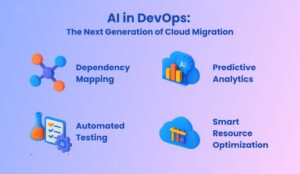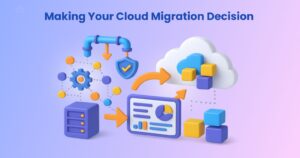Cloud migration projects can make or break a company’s digital transformation journey. While moving to the cloud promises better scalability, cost savings, and innovation opportunities, the path there is often riddled with technical challenges, security concerns, and operational disruptions. This is where devops as a service companies step in to transform what could be a chaotic migration into a smooth, strategic transition.
Organizations worldwide are discovering that successful cloud migrations require more than just moving data from point A to point B. They need comprehensive strategies that address infrastructure automation, continuous integration and deployment, monitoring, and security—all while maintaining business continuity. Smart companies are turning to specialized devops consulting and managed cloud services to navigate these complexities with confidence.
The statistics speak volumes: companies that partner with experienced devops managed services providers are 3x more likely to complete their cloud migrations on time and within budget. They also experience 60% fewer post-migration issues and achieve operational efficiency goals 40% faster than organizations attempting migrations independently.
Understanding devops as a service companies
devops as a service companies have emerged as specialized partners who really understand both the technical side and the day-to-day realities of running cloud operations. While your typical IT consultant might handle one piece of the puzzle—maybe the infrastructure setup or security configuration—these firms take care of everything from planning through post-migration support.
You’ll find teams that include cloud architects working alongside automation experts, security pros, and seasoned DevOps engineers. Here’s what they get that many others miss: moving to the cloud changes everything about how your teams collaborate, ship code, and keep systems running smoothly. It’s not just a technical lift-and-shift.
The really good devops as a service companies take time to understand your specific situation. They’ll dig into your current setup, learn how your business actually works, and build a migration plan that makes sense for you. No generic templates or one-size-fits-all solutions.
Here’s where experience really pays off. These providers have been through cloud migrations dozens or even hundreds of times. They’ve seen the weird edge cases, the unexpected gotchas, and the problems that only surface at 2 AM during go-live weekend. That battle-tested knowledge means your project moves faster, runs into fewer roadblocks, and you actually know what to expect along the way.
The Role of DevOps Consulting in Cloud Migration Success
DevOps consulting serves as the strategic foundation for successful cloud migrations. Expert consultants begin by conducting comprehensive assessments of existing infrastructure, applications, and workflows. They identify dependencies, potential roadblocks, and opportunities for improvement that internal teams might overlook.
One of the biggest advantages of professional DevOps consulting is the creation of detailed migration roadmaps. These aren’t generic templates—they’re customized plans that account for specific business requirements, compliance needs, and risk tolerance levels. Consultants help organizations prioritize which applications to migrate first, which can stay on-premises temporarily, and which might need re-architecting for cloud optimization.
DevOps consulting isn’t just technical—it’s about helping your team actually adjust to working differently. Moving to the cloud means learning new tools and completely different ways of doing things. Good consultants spend real time getting your developers comfortable with infrastructure as code, containers, microservices, and automated deployments. Otherwise, you’ll have shiny new cloud infrastructure that nobody knows how to use properly.
The other thing experienced consultants obsess over is having solid backup plans. They’ll set up multiple ways to roll back if things go sideways during migration. Trust me, you want these safety nets in place before you need them, because when production breaks at midnight, you don’t have time to figure out recovery procedures on the fly. They also establish monitoring and alerting systems before migration begins, providing visibility into system performance throughout the transition.
Perhaps most importantly, DevOps consultants help organizations avoid common pitfalls that can derail cloud migration projects. These include underestimating data transfer times, overlooking network latency issues, inadequate security planning, and insufficient testing of migrated applications.
How Managed Cloud Services Accelerate Migration Timelines
Managed cloud services take the operational burden off internal teams, allowing them to focus on core business activities while experts handle the technical complexities of cloud migration. This approach dramatically accelerates timelines because organizations aren’t spending months building internal expertise from scratch.
Professional managed service providers bring pre-built automation tools and proven processes that would take internal teams months to develop. They have standardized approaches for common migration scenarios, along with specialized solutions for complex edge cases. This means migrations that might take internal teams 12-18 months can often be completed in 6-9 months with the right managed service partner.
Devops managed services providers also offer round-the-clock support during critical migration phases. Cloud migrations don’t happen during business hours only—they require careful orchestration across different time zones and systems. Having 24/7 expert support ensures that issues get resolved quickly, preventing small problems from becoming major delays.
Another significant advantage is the provider’s existing relationships with cloud platforms. Established managed cloud services companies often have direct connections with AWS, Azure, and Google Cloud teams. This means faster resolution of platform-specific issues and access to beta features and advanced support options that might not be available to individual organizations.
The cost benefits are substantial too. Instead of hiring and training multiple specialists—cloud architects, DevOps engineers, security experts—organizations can access an entire team of experts for a fraction of the cost of building these capabilities internally.
AI in DevOps: The Next Generation of Cloud Migration

AI in DevOps is revolutionizing how organizations approach cloud migrations. Artificial intelligence and machine learning are no longer just buzzwords—they’re practical tools that make migrations faster, safer, and more efficient.
AI-powered tools can automatically discover and map application dependencies, something that traditionally requires weeks of manual analysis. These tools scan existing environments and create detailed dependency maps that help migration teams understand which systems must move together and which can be migrated independently.
Predictive analytics powered by AI help teams anticipate and prevent migration issues before they occur. By analyzing patterns from thousands of previous migrations, AI systems can flag potential problems and recommend preventive measures. This proactive approach significantly reduces the risk of unexpected downtime or performance issues.
Automated testing is another area where AI in DevOps shines during cloud migrations. AI-driven testing platforms can automatically generate test cases, simulate user behavior, and validate that migrated applications perform correctly in their new cloud environment. This level of automated validation would be impossible to achieve manually within reasonable timeframes.
Smart resource optimization is perhaps the most immediately valuable application of AI in cloud migrations. AI systems continuously analyze workload patterns and automatically adjust cloud resources to optimize performance and cost. This means organizations start realizing cloud benefits immediately, rather than spending months on manual optimization after migration.
DevOps Best Practices for Seamless Cloud Transitions
Implementing proven DevOps best practices is essential for migration success. The foundation starts with infrastructure as code (IaC), which allows teams to define and manage cloud infrastructure using version-controlled code rather than manual configurations. This approach ensures consistency, reduces human error, and makes it easy to replicate environments across development, testing, and production.
Continuous integration and continuous deployment (CI/CD) pipelines are another cornerstone of successful cloud migrations. These automated pipelines ensure that code changes are thoroughly tested before deployment and that rollbacks can happen quickly if issues arise. During migration, CI/CD pipelines provide confidence that applications will work correctly in their new cloud environment.
Containerization represents a game-changing DevOps best practice for cloud migrations. By packaging applications in containers, organizations can ensure that software runs consistently across different environments. This eliminates the common “it works on my machine” problems that can plague migration projects.
Monitoring and observability must be built into cloud environments from day one. The best practice is implementing comprehensive monitoring before migration begins, not after. This provides baseline performance metrics and ensures teams can quickly identify and resolve any issues that arise during the transition.
Security should be integrated into every aspect of the migration process, following DevSecOps principles. This means automated security scanning, compliance checks, and threat detection are built into deployment pipelines rather than being afterthoughts.
Choosing the Right DevOps Managed Services Provider
Selecting the right partner among devops as a service companies can determine whether your cloud migration succeeds or becomes a costly learning experience. The most important factor is proven experience with migrations similar to yours in terms of scale, industry, and technical complexity.
Look for providers who offer transparent communication and detailed project visibility. The best devops managed services companies provide regular progress updates, clear metrics, and collaborative planning processes. They should treat your migration as a partnership, not just a service delivery.
Technical certifications and cloud platform partnerships matter significantly. Top-tier providers maintain advanced certifications with major cloud platforms and demonstrate ongoing investment in their teams’ skills. They should also have established relationships with cloud vendors that can benefit your migration.
Cultural fit is equally important. Your chosen provider should understand your organization’s risk tolerance, compliance requirements, and business objectives. They should be able to adapt their approach to match your company’s pace and style of decision-making.
Finally, consider the provider’s post-migration support capabilities. Cloud migration is just the beginning—you’ll need ongoing optimization, monitoring, and support as your cloud environment evolves. The best devops as a service companies offer comprehensive managed services that continue long after migration completion.
Making Your Cloud Migration Decision

The evidence is clear: organizations that partner with experienced devops as a service companies achieve better cloud migration outcomes across every measurable metric. They complete projects faster, encounter fewer issues, realize benefits sooner, and build more robust cloud operations.
The key is choosing partners who combine deep technical expertise with a collaborative approach to client relationships. Look for providers who invest in cutting-edge tools like AI in DevOps while maintaining focus on proven DevOps best practices. The right partnership transforms cloud migration from a risky technical project into a strategic business advantage.
Your cloud migration success depends on more than just technical execution—it requires the right strategy, the right tools, and the right team. devops consulting and managed cloud services provide all three, turning complex cloud transitions into competitive advantages that drive long-term business growth.
Frequently Asked Questions
Q1: How long does a typical cloud migration take with DevOps as a service companies? Most migrations take 6-12 months depending on complexity and scope. DevOps specialists can often reduce timelines by 30-50% compared to internal-only efforts through proven automation tools and streamlined processes.
Q2: What’s the difference between DevOps consulting and managed services? DevOps consulting focuses on strategy, planning, and implementation guidance. Managed services provide ongoing operational support, monitoring, and optimization. Many companies benefit from both during different phases of their cloud journey.
Q3: How does AI in DevOps specifically help with cloud migrations? AI automates dependency mapping, predicts potential issues, optimizes resource allocation, and accelerates testing processes. This reduces manual work and helps teams identify problems before they impact migration timelines.
Q4: What should I look for when evaluating DevOps managed services providers? Look for teams who have actually done migrations like yours before—not just any cloud work, but specifically moving companies similar to your size and industry. Check their cloud certifications, sure, but more importantly, see if they communicate clearly and keep you in the loop throughout the project. You don’t want to be left wondering what’s happening for weeks at a time.
Also think about the long game. Do these people understand your business well enough to be helpful partners down the road? Cultural fit matters more than you might think—you’ll be working closely together during stressful moments, so personality and work style compatibility can make or break the experience
Do you like to read more educational content? Read our blogs at Cloudastra Technologies or contact us for business enquiry at Cloudastra Contact Us.